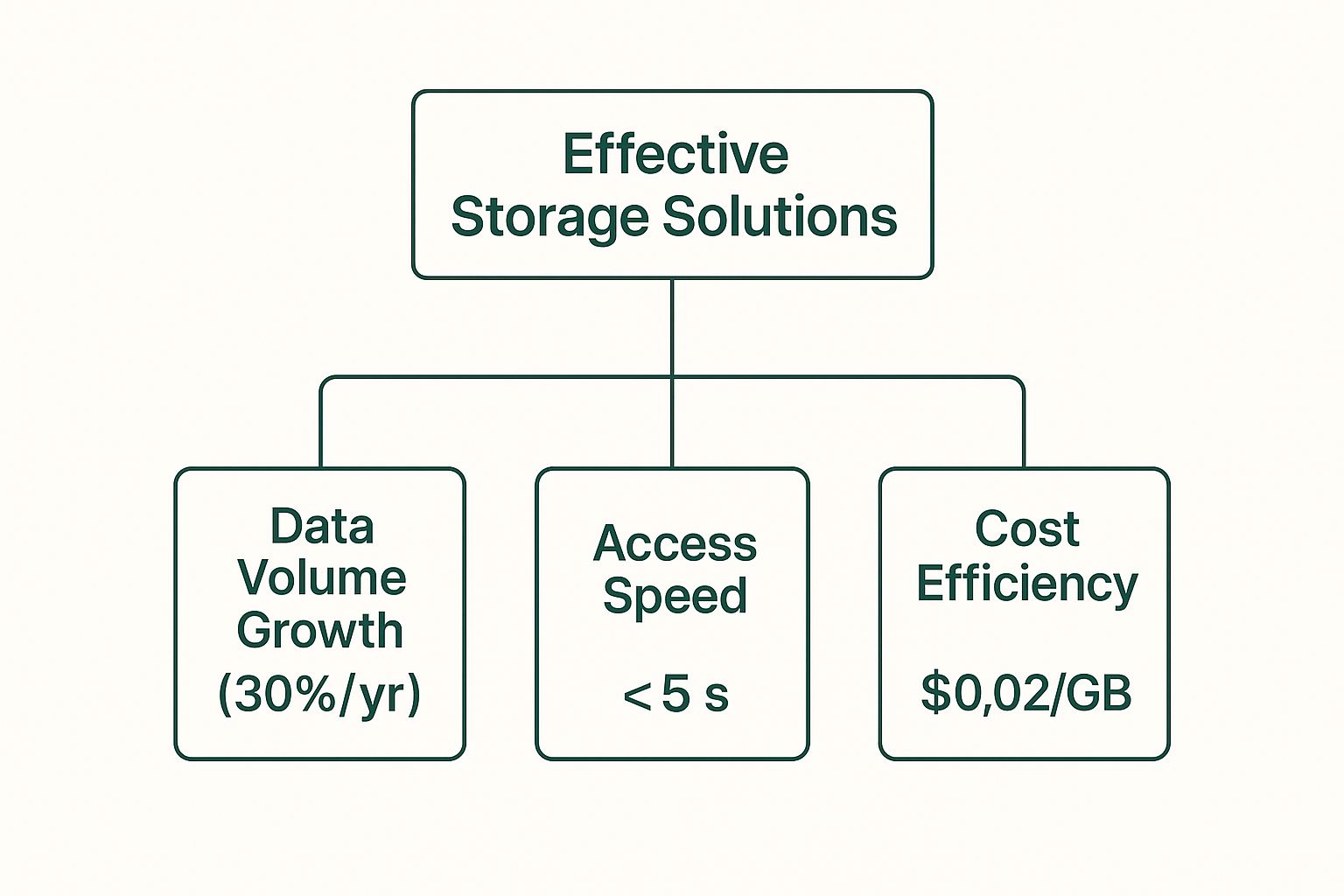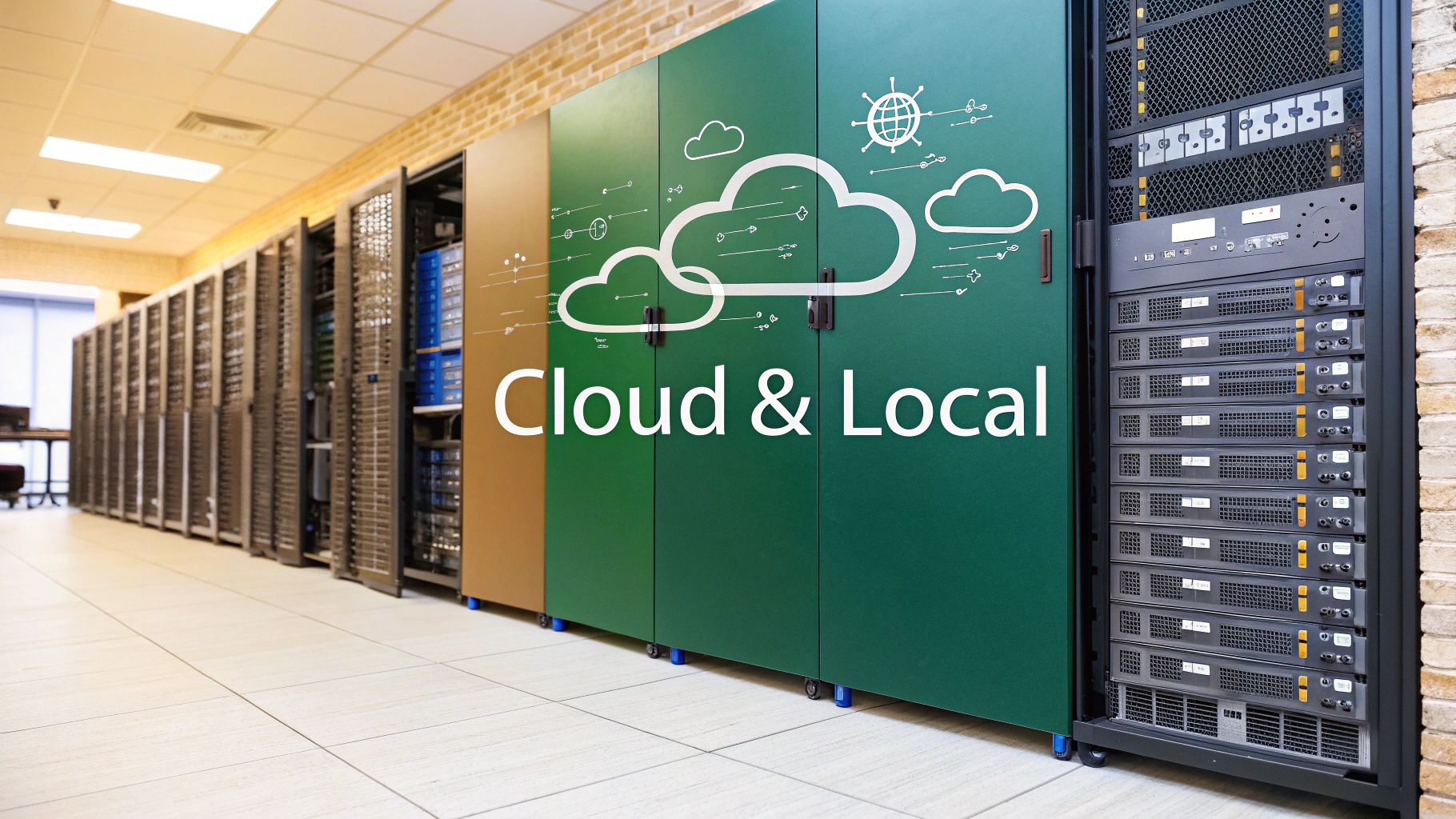Top Storage Solutions for Businesses | Secure & Optimise Space
Running a business means juggling a lot of moving parts, and one of the most overlooked is storage. We're not just talking about dusty old filing cabinets, either. Proper storage solutions for businesses cover everything from your physical stock to the critical data that keeps you running. Nail this, and you're on your way to a more efficient, secure operation.
Finding the Right Storage for Your Business
Looking for the right storage can feel like a massive task, but it helps to split it into two main camps: physical storage for all your tangible stuff, and digital storage for your invaluable data. Think of it this way: every successful company needs a secure warehouse for its products and a fortified digital vault for its information. One without the other just doesn't work.
A smart storage plan is far more than just renting some space. It's a cornerstone of your daily operations, your security, and your ability to grow. Get it wrong, and you're looking at chaos, security risks, and surprise costs that can really hold you back.
Core Decision-Making Factors
So, where do you start? When you're weighing up your options, there are four non-negotiables that should steer your decision. Getting these right is the key to finding a solution that feels like it was made for you.
- Cost: This isn't just the sticker price. It's the monthly rent on a storage unit, the subscription fees for cloud services, and any hidden extras. A clear budget will instantly help you filter out what won't work.
- Accessibility: How fast and how often do you need to get to your things? This could be 24/7 access to a self-storage unit for last-minute stock runs, or it could mean your team needs instant access to cloud files from anywhere.
- Security: Protecting your assets is paramount. For physical items, that means CCTV, alarms, and secure gates. For data, it’s all about robust encryption, firewalls, and multi-factor authentication.
- Scalability: Your business won't stay the same size forever. The best storage solutions grow with you, making it simple to get more space (or downsize) as your needs shift.

As you can see, the sweet spot is finding a solution that can handle rapid growth without sacrificing easy access or blowing your budget. This balancing act is just as true for physical inventory, where a little organisation goes a long way. For a deeper dive into that, have a look at our guide on inventory management for small businesses.
Smart Physical Storage for Modern Companies
Let's be honest, physical storage has moved well beyond a dusty back-office cupboard. These days, smart storage solutions for businesses are a genuine strategic tool. Across the UK, savvy companies are using them to gain a competitive edge by freeing up expensive workspace and becoming far more agile. Solutions like commercial self-storage, container storage, and specialist document archiving aren't just a nice-to-have; they're becoming essential.
Think of a growing e-commerce brand. They can use a local self-storage unit to manage their ever-changing inventory without locking themselves into a costly, long-term warehouse lease. This gives them the freedom to ramp up stock for Christmas and then scale back in the quieter months, keeping cash flow healthy and letting them react instantly to market trends.
Or take a construction firm. They can use secure container storage, either on-site or at a nearby facility, to protect thousands of pounds worth of tools and materials from theft and the unpredictable British weather. It’s a simple move that massively improves project organisation and slashes preventable losses.

Unlocking Key Business Benefits
The perks of adopting a modern physical storage strategy are tangible and immediate. Businesses that get a handle on their physical assets often see a ripple effect of improvements, from day-to-day efficiency right through to their long-term financial health.
Here’s what you stand to gain:
- Decluttering Workspace: Getting excess stock, equipment, or files out of your main premises does more than just tidy up. It reclaims valuable floor space, boosting productivity and creating a more professional environment for staff and clients alike.
- Enhanced Security: A professional storage facility isn't just a lock-up. You get layers of security like CCTV, coded gate access, and on-site staff—far more protection than your average stockroom can offer.
- Cost-Effective Scalability: Renting storage space is vastly cheaper than leasing or buying larger commercial premises. It offers the flexibility to scale your space up or down as your business dictates, not as a lease agreement demands.
Real-World Applications and Growth
This isn't just a niche trend; it's a massive shift in how UK businesses operate. The numbers speak for themselves. The UK self-storage sector's annual turnover shot past £1.2 billion by early 2025. In the last year alone, total available space grew by 7.2% to reach a staggering 64.3 million square feet.
This boom is being driven by businesses, especially in crowded urban centres like London, Manchester, and Birmingham, who are desperately seeking practical alternatives to eye-wateringly expensive commercial space. You can get a deeper dive into these UK self-storage industry trends on JanusEurope.com.
By moving non-essential items, seasonal stock, or archived documents off-site, a business can transform its primary location into a more productive and profitable area. This strategic organisation is fundamental to efficient operations.
For many businesses, the first step is figuring out what kind of space they actually need. If you need a hand with that, take a look at these essential tips for choosing a self-storage unit.
Whether you're a law firm using secure archiving to meet compliance rules or a retailer stashing seasonal displays, the right storage solution makes your business run smoother and strengthens your bottom line.
Keeping Your Business Data Safe: Digital and Cloud Storage
In business today, data isn't just a byproduct; it's one of your most valuable assets. Keeping it safe and accessible is non-negotiable, and that means getting to grips with your digital storage options. While the tech can seem daunting, it really boils down to two main paths: running your own servers on-site or using the cloud.
Let's break it down with an analogy.
An on-premise server is like owning your own warehouse. You control everything—the layout, the security guard at the door, who gets a key. It's all yours. Of course, that also means you're on the hook for building it, maintaining it, fixing the roof when it leaks, and paying for all of it upfront.
Cloud storage, on the other hand, is more like using a state-of-the-art logistics and storage facility. You don't own the building, but you can rent a locker, a room, or an entire floor. An expert team handles the security, maintenance, and climate control for you, and you just pay for the space you use. This gives you incredible flexibility and access to top-tier infrastructure without the massive capital outlay.
Why So Many Businesses Are Making the Switch to the Cloud
The move towards cloud storage isn't just a trend; it's a fundamental shift driven by some very real, practical advantages that old-school on-site servers just can't match. For most businesses, the benefits are simply too compelling to overlook.
Here’s why the cloud is winning out:
- Effortless Scalability: Hit a busy season and need more storage? With the cloud, you can expand your capacity in minutes. When things quieten down, you can scale right back. You only ever pay for what you actually need, which is a game-changer for managing costs.
- Work From Anywhere: As long as your team has an internet connection, they can securely access the files they need, wherever they are. This is the backbone of modern flexible working and makes collaborating across different offices or even countries a breeze.
- Serious Disaster Recovery: Good cloud providers don't just store your data in one place; they replicate it across multiple, highly secure locations. So, if the worst happens—a fire, a flood, a major hardware failure at your office—your data is safe and can be restored quickly, keeping your business up and running.
The UK Data Storage Boom
This shift to smarter, more secure digital storage is happening on a huge scale right here in the UK. We're generating more data than ever before, and all of it needs to be managed properly. The market is exploding to meet this demand.
Projections show the UK data storage market is expected to hit around £8.9 billion in 2025 and is on track to soar to £42.6 billion by 2035. That’s a staggering compound annual growth rate of 14.5%, powered by innovations in hybrid cloud technology and edge computing. You can dig into the numbers in this report from Future Market Insights.
For any UK business, picking a storage solution is about more than just gigabytes. You have to think about compliance with regulations like UK GDPR. Data sovereignty—the simple peace of mind that comes from knowing your data is stored securely within the UK's legal jurisdiction—is a massive factor.
The final piece of the puzzle is understanding the different flavours of cloud. You've got public clouds (like Amazon Web Services or Microsoft Azure) that offer incredible scale, private clouds that provide dedicated resources just for your organisation, and hybrid models that mix and match. A hybrid approach lets you keep your most sensitive data on your own private server while using the public cloud's power for everything else. It's the best of both worlds.
Choosing the Best Storage Solution for Your Needs
Alright, you've got a handle on the different types of physical and digital storage out there. Now comes the important part: turning that knowledge into the right decision for your business. Finding the perfect mix of storage solutions for businesses isn't about chasing a one-size-fits-all "best" option. It’s about finding what fits your daily operations like a glove.
A little bit of structured thinking here goes a long way. It’ll help you avoid costly missteps and land on a solution that actually helps you grow. We’ve found the best way to do this is to break it down into four key areas: Security, Accessibility, Scalability, and Cost. Let's walk through how to weigh up your needs against each of these pillars.

Analyse Your Security Requirements
Let’s start with the absolute deal-breaker: security. Whether it's a physical break-in or a digital breach, the consequences can be devastating. You need to think about protecting both your tangible goods and your digital data, as the security measures for each are completely different worlds.
It all starts by asking some honest questions.
- For your physical stuff: Are we talking about a few boxes of old files that just need a decent lock, or are you storing high-value stock that demands 24/7 CCTV, coded gate entry, and staff on-site? The value of what you’re storing should dictate the level of protection you invest in.
- For your digital data: How sensitive is the information you're holding? Basic password protection might be fine for some things, but if you're handling customer data, you'll need to look at serious measures like end-to-end encryption, multi-factor authentication, and ensuring you’re compliant with UK laws like GDPR.
Evaluate Accessibility and Scalability
Next up, think about how you actually use your stuff. How often do you need to get to it? A storage solution that’s a pain to access just creates friction and slows everyone down. At the same time, you need a setup that can grow with you, not hold you back.
A storage solution should be an enabler of growth, not a barrier. The ability to easily scale your storage up or down in response to demand is a key indicator of a flexible and cost-effective system.
Consider your team's workflow. If you run an e-commerce shop, having 24/7 access to your stock in a self-storage unit could be essential. On the other hand, if you're just archiving old accounts, standard office hours might be perfectly fine. For digital files, can your team grab what they need securely and instantly, even when working from home? These answers will point you towards the right service.
It’s also crucial to look to the future. Is your inventory expanding? Is your data growing exponentially? A cloud plan that lets you upgrade with a click or a self-storage facility offering a range of unit sizes gives you the agility a modern business needs. Getting a handle on physical space can be tough, which is why using a helpful storage space calculator is always a smart move before you commit.
Balance Cost Against Value
Of course, it all has to fit within the budget. But here’s a word of caution: the cheapest option is very rarely the best value in the long run. Don't just look at the monthly price tag; think about the total cost and what you’re getting in return.
For instance, a slightly pricier cloud plan with rock-solid disaster recovery built-in could literally save your business from going under if the worst happens.
Similarly, a secure, easily accessible self-storage unit might have a higher monthly fee than a basic garage lock-up, but the peace of mind from reduced theft risk and a smoother workflow often pays for itself many times over. You need to carefully weigh the monthly fees and any hidden charges against the real-world benefits that things like great security, easy access, and scalability bring to the table.
Beyond a One-Size-Fits-All Solution: Specialised and Hybrid Storage
As a business grows, its storage needs rarely stay simple. Sticking with a single, basic solution just doesn't cut it when you're dealing with a mix of assets, each with its own specific requirements. This is where specialised and hybrid storage models really shine, giving you a setup that's perfectly matched to how you actually operate.
Think about it. If your business handles delicate electronics or temperature-sensitive pharmaceuticals, you can't just stick them in any old lock-up. You need climate-controlled storage to protect them from heat, cold, and humidity. Likewise, a law firm can't afford to be casual with client files. They need high-security archiving that guarantees confidentiality and meets strict legal standards. It’s about getting the right protection for the right asset.
Getting the Best of Both Worlds: The Hybrid Approach
More and more businesses are catching on to a smarter way of thinking: the hybrid model. This isn't about compromise; it’s about strategically blending physical and digital storage to manage everything as efficiently as possible.
A classic example is a retailer gearing up for the Christmas rush. They might use a local, secure self-storage unit to hold all that extra seasonal stock. It keeps the main shop floor clear and provides easy access when they need to restock quickly. Meanwhile, all their vital information—inventory lists, sales data, customer records—is safely stored in the cloud. This combination gives them flexibility on the ground and rock-solid data security. For a closer look at how this works in practice, check out the major benefits of using a storage container for business stock.
A hybrid storage strategy is all about optimisation. It empowers a business to place every asset, physical or digital, in the most secure, accessible, and cost-effective environment for its needs.
How Different Industries are Shaping Storage Trends
This shift towards more sophisticated storage is especially clear in sectors that are heavy on tech or sensitive data. The huge demand for advanced data centre storage in the UK isn't coming from everywhere; it’s being driven by a few key industries with enormous data appetites.
Recent figures paint a very clear picture. The IT & telecommunications sector makes up about 30% of the demand. Not far behind are banking, financial services, and insurance (BFSI) at 25%, with government bodies taking up another 15%. In 2023, the UK’s data centre storage market was valued at roughly £6 billion. A significant chunk of that—around 40%—went to all-flash storage, chosen for its incredible speed. It’s a powerful signal that businesses are investing heavily in high-performance, specialised digital solutions. You can dig deeper into this trend in this UK data centre storage market analysis.
By getting to grips with these trends, you can start building a storage strategy that's not just effective today but is also resilient enough for tomorrow. The key is to combine the right physical storage solutions for businesses with the right digital infrastructure. That's what will set you up for whatever challenges and opportunities lie ahead.
Putting Your Business Storage Strategy into Action

It’s one thing to have a plan on paper, but turning it into a real-world, working system is where the magic happens. A smart storage setup isn't just another line item on your expenses; it's a genuine asset that can sharpen your efficiency, bolster security, and give you the breathing room to grow.
The first, most practical step is to get your physical assets organised. This isn’t just about chucking things in boxes. It means creating a proper inventory, labelling everything with clear, consistent information, and designing a system so you can find what you need without a frantic search. The same logic applies to your digital files – sort out your naming conventions and folder structures now to avoid a digital mess later.
The best storage strategies aren't set in stone. Think of them as living, breathing parts of your business that need to be checked on and tweaked as you evolve.
Finally, make it a habit to review your storage. Pop a reminder in your calendar every six months or so. The needs of a business are constantly changing, and the solution that was perfect last year might be holding you back today. Regularly auditing your storage solutions for businesses—both the physical space and your digital setup—ensures you're only paying for what you need and that your system is still pulling its weight. This is how you get real, long-term value from your investment.
Frequently Asked Questions
It’s completely normal to have questions when you're figuring out the best storage for your business. To give you a bit more clarity, we’ve put together answers to some of the things business owners in the UK ask us most often.
How Much Does Business Self-Storage Cost in the UK?
The price of a self-storage unit for business use can vary quite a bit. The final figure really depends on where you are, the size you need, and whether you require special features like climate control.
As a general rule of thumb, you might expect to pay anywhere from £15 per week for a small locker, perfect for documents, up to £100 or more per week for a larger space that can handle palletised stock. Unsurprisingly, you'll find costs are typically higher in major cities like London and Manchester. The best thing to do is get a few quotes from local facilities and don't be shy about asking if they have any introductory offers or special rates for businesses.
Is Cloud Storage Secure Enough for Confidential Business Data?
For the most part, absolutely. Leading cloud storage providers put enormous resources into security—often far more than a small business could ever afford on its own. We're talking about things like end-to-end encryption, multi-factor authentication, and constant security audits.
The crucial thing when dealing with sensitive information is choosing a provider that is fully compliant with UK GDPR and any other regulations that apply to your industry. Always check for transparency about their security protocols and look for features that let you have tight control over who can access your files.
Doing this homework upfront means you can be confident that only the right people can see or change your company's private information.
What is the Difference Between Data Archiving and Backing Up?
This is a great question, and it's easy to get the two mixed up. While they sound similar, they play very different roles in managing your data.
Think of it this way:
- Backing up data is like making a quick copy of everything you're working on right now. It's about creating a recent snapshot of your active files so you can get back up and running fast if something goes wrong, like a system crash or accidental deletion. It's your safety net for business continuity.
- Archiving data, on the other hand, is more like packing old project files away into a long-term library. You're moving data that you don’t need day-to-day but have to keep for legal or compliance reasons. This data gets shifted to a cheaper storage solution, but it’s still there if you ever need to retrieve it.
A smart data strategy really needs both: regular backups to keep your business running smoothly and a clear archiving policy for your historical records.
Ready to find the perfect space for your business assets? The team at MG Self Storage offers flexible, secure, and accessible units designed to help your business grow. You can explore our business storage options and book your unit today.




